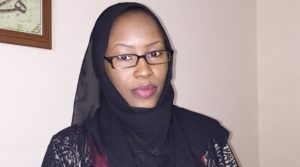“Boko Haram: How prostitution thrives in displaced persons’ camps”
Fatima Askira is the executive director of Borno Women Development Initiative (BOWDI), a Maiduguri, Nigeria-based NGO working with women victims of the Boko Haram insurgency in Internally Displaced Persons (IDP) camps and host communities in Borno state. In a chat with African Newspage, she speaks about their efforts of alleviating the sufferings of the women, most of whom have lost their husbands

What is the Borno Women Development Initiative about?
Borno Women Development Initiative is a non-governmental organization focusing on women’s empowerment and women’s related issues, at the moment we are working on a sensitization program for women victims of the Boko Haram insurgency in IDPs camps and host communities, with the hope that the beneficiaries of the program will be empowered to speak about the challenges they are going through particularly as regards gender-based violence.
We carry out the sensitization activities in IDPs camps and host communities on a one-on-one basis and this is to give the women the opportunity to freely express their challenges and suggest viable solutions for themselves. We do it phase by phase, taking 30 women for every phase with whom we discuss the challenges they are going through including what they think promotes gender-based violence among them; either in the camps or in host communities.
After that we donate some items to them including wrappers, toiletries and sanitary materials etc. At the end you will get to understand it is not like that there are no cases of rape and other forms of gender-based violence in the camps, rather for fear of stigmatization, they are actually scared of saying it out. We are yet to record any such cases but I know gradually they will open up because they are gradually acquiring the confidence to open up about such issues especially with the confidentiality we are guaranteeing them.
As a result of the huge successes the military is recording in their onslaught against the Boko Haram insurgents, the IDPs are gradually returning to their communities. How can you describe the plight of such women IDPs in Borno state?
The situation here I can say is now excellent due to the successes recorded by the military, I say excellent because for a month we have not heard that someone has been killed or a bomb has went off in a market, I think it is a great success for us. Everyone is looking forward to going back to their communities but the challenge is that these people have been here for the last 2 years, enclosed in IDPs camps, while some are living in host communities but it is not like they have anything tangible they are doing for a living.
So, what we are looking at is how we can empower some of these people to be able to go back to their communities and be productive. Secondly, there are some communities which have been totally brought down and even though they are being rebuilt, to be honest, some of those IDPs will not want to go back there. In this case we are in a dilemma as to what to do about them, do we encourage the government to accommodate them here in Maiduguri or we should ask the government to find a way of getting them returned to their communities.
Why do you think some of the IDPs would not want to go back to their communities?
I believe this is because of the so many social changes in their life particularly for those who migrated from rural to urban areas and they have now comfortably settled down within us. They are always going from one office to another seeking for help and people sympathize with them and so are giving them stipends and they now seem comfortable with that way of living. Therefore, I don’t think such people will want to go back to their communities because they have already adopted a new social status in urban areas which means they would not want to go back to their rural communities which means they will lose their newly acquired social status.
There are thousands of women who have lost their husbands to the insurgency and are now battling to survive and be able to cater for their kids. How can you describe the situation of such women?
Honestly, there are such women and their situation is pretty bad, based on a research by my organization which focused on the women, we have found a lot of female headed families within the camps and also within the host communities, the living condition of these women is honestly bad because most of them are not engaged in anything for livelihood; they were dependent on their husbands for all their needs.
Now that they have lost their husbands they don’t know where to start from and that I feel has promoted a lot begging in the street. You see women begging in the street with their children. I feel it is a terrible situation needing urgent attention, we are not very much concerned about the women who are already grown up rather we are more concerned about the plight of those children that have been left with the women.
What is the future of this child that has grown up under such hardship, almost all these children will end up becoming almajiris, which is an issue we are already fighting now. How can we get these kids enrolled in school since if the mothers can barely feed them how then can they afford to send them to school? Honestly it is a terrible situation and a lot needs to be done to alleviate the situation.
Like you said, many of the women in the camps have lost their husbands while their children have lost their fathers; how much has this development exposed the women and their children to violence?
Really, it has exposed them to violence including rape but due to stigmatization they don’t get to open up but believe me I have been getting reports that prostitution has become the norm within the IDP camps, such incidents have become significantly higher because, in their efforts to fend for their families, the women engage in sex for pay, which may also promote the spread of sexually transmitted diseases, STDs, among the IDPs. These are the post insurgency challenges we are battling with. Of course, young girls in host communities and IDPs camps are also vulnerable but because they don’t say it out no one get to know about it. This is why I think the sensitization my organization is doing will help them open up since it gives them total confidentiality, then we will know the factors pushing them into prostitution.
How serious is the issue of prostitution among women and girls in the IDP camps?
The camp setting somehow allows for prostitution to thrive, some of the camps have restrictions but some do not really have. Honestly speaking, based on reports from the camps, prostitution is going on in the camps. In fact I heard of a place which serves as brothel where the women IDPs go and get paid for sex; I heard they are paid as little money as about N500 or N200.












